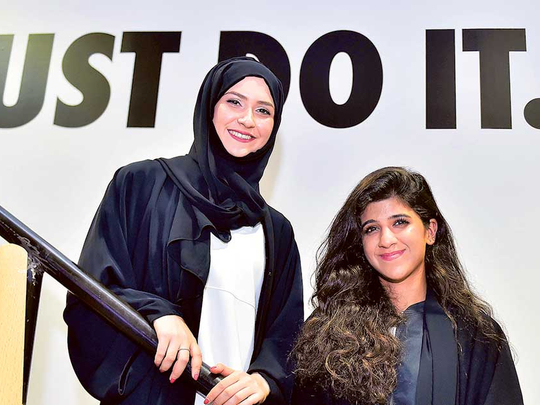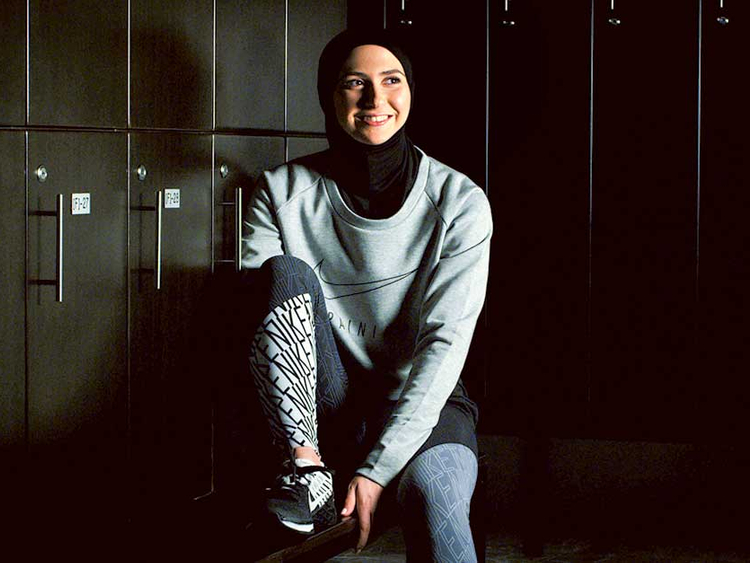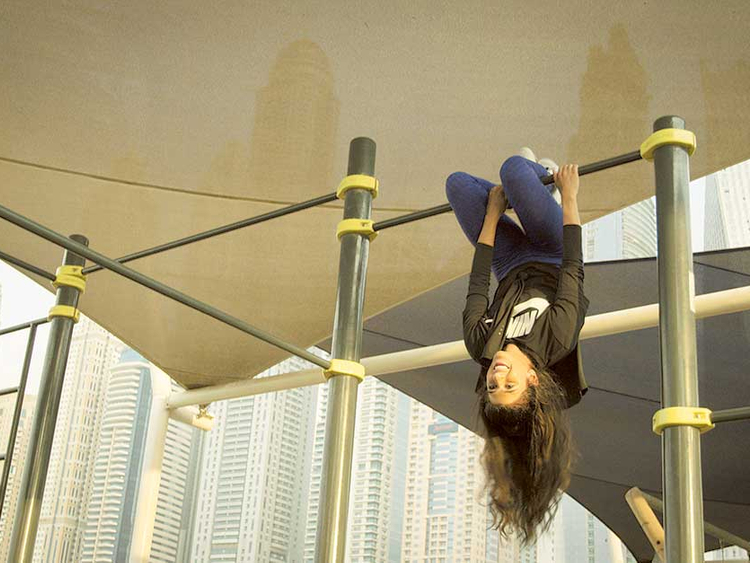
One is a slim 21-year-old known as the Princess on Ice, the other a petite 25-year-old is the self-proclaimed “monkey in the family”. But Zahra Lari and Amal Murad are pioneers, despite starting late in the sporting world.
While Murad took on parkour at 23, Lari was 12 when she started learning to skate and competed internationally for the first time in 2012. The hijab-clad demure Lari is the UAE’s first figure skater, training to qualify for the 2018 Winter Olympics in South Korea. The non-hijabi bubbly Murad is preparing for marriage along with training women in the unusual sport of parkour. Sports brand Nike has picked them for a new regional campaign to inspire Arab women to join the world of sports.
“When you are passionate about something, it’s never too late. I never intended to be an instructor but in my journey of finding myself, I wanted to give the opportunity to other people to share this journey with me,” said Murad. “This in a way helped me find my way in.”
Gulf News tabloid! sat down for a quick chat with the two young women at an event late last month in Alserkal Avenue in Dubai.
You both have broken cultural barriers to achieve your dream. What were the challenges you faced?
Lari: My major challenge was to make people understand figure skating is not dancing but an actual Olympics sport. It was because culturally, they [didn’t approve me] performing before an audience that has men. But now more people are accepting and understanding, and I’ve a lot of support within and outside the country.
Murad: When I first started people questioned why I wanted to do it – not just the society but my family as well – because they didn’t know parkour was a sport. But I was known as the monkey in the family anyway, and when they saw what I was doing, they related it to a disciplined sport like gymnastics. However, parkour felt more free-spirited to me. I’m a [graphic] designer, so I express a lot and I like expressing through movement too. At the same time I [didn’t want] to be competitive, while gymnastics is competitive. [Apart from building physical strength] parkour also requires mental toughness. So just familiarising people to the sport was the first big step.
Next hurdle was that I had never been to a co-ed gym. What pushed me to teach women was that [here] we don’t have facilities that offer certain sports to them.
So did training with men make you feel uncomfortable, personally?
Lari: Well, I didn’t feel uncomfortable that some of my coaches were men. Plus rinks are public, so men are always coming and going. But all you need to do is focus on your training and not think about your surroundings.
Murad: I was never used to training in front of men so it did take a lot from me. I convinced my parents that I really wanted to do this and the only thing they told me was to respect my culture. People think because I’m not a hijabi I do whatever I want. That’s not the case. I still have my values, I still tend to be conservative in the way I dress. What was exciting, however, was that I thought men would reject me because I was a girl in a male dominated sport. But when the guys saw me get better, they got inspired.
Did you face similar issues outside the country too? What troubled you more – the ones inflicted by your own people or the outer world?
Lari: Actually no one ever said anything bad to me when I competed internationally. I did get a few strange looks initially but then it became more an interest in me and my country. The hijab wasn’t allowed in skating and I did get points deducted for it. But it never stopped me; I still competed. I fought for what I believed in and now they’ve put in the rules that ladies are allowed to wear a hijab. People come up to me and tell me what I’m doing is great and they are so supportive.
Women [from this part of the world] weren’t involved much in sports so it was harder for me when I got negative feedback, especially when it was from within the UAE. But I always had the support of Her Highness Shaikha Fatima Bint Hazza Bin Zayed Al Nahyan [Chairwoman of Fatima Bint Mubarak Ladies’ Sports Academy], who always told me “the country is supporting you, so don’t listen to them”. This helped me a lot and I stop bothering.
Murad: I had a mother tell me that she didn’t want her daughter to grow up and be like me, which hurt me a lot. Even the falls aren’t as painful as what people said. But that is the very reason why I feel parkour helped me push through because, in parkour you don’t have time to overthink. And I tend to. But I felt as long as I respect myself, I’ll get the respect from others.
Despite the mindset changing, I still get negative feedback. But [I believe] people are threatened by what they are not familiar with. I don’t blame anyone for what they think because that’s how we were raised to think. This has to change through our action and I always understand the other person’s point of view, regardless it’s for or against me. As long as they know what my cause is, I’m ok.
As for outside the Arab world, parkour is a well-known sport. What’s interesting is [it surprised them that] I was an Arab girl. And I believe that when you show people you are passionate about something, regardless of your race, they are passionate about it too.
Obviously you both undergo intense training. Tell us about your workout.
Lari: With figure skating it’s not one sport but a combination of various disciplines. My routine includes 3-4 hours on ice each day. Then we have to do off-ice training: ballet, dance, gym, weight lifting, gymnastics... at one time I had to try boxing too. When I have competitions I have to skip semesters – I’m studying at university – in order to focus on the training. But I love what I’m doing. So it’s worth it.
Murad: I have a very tight schedule. I finish work at 2.30-3pm. I’m at the gym from 4pm, until 7pm sometimes. So I’m really drained by then. But I have to train for an hour at least. I need to really focus on myself or I will not be able to give to others. Yes, it’s a struggle because I always have to push through even if I’m exhausted. Why I do and teach parkour is because, apart from the falls, you need to cross a lot of mental barriers yourself. What people need to know is, it’s ok to fall and it’s ok to fail.
So what keeps you motivated?
Lari: First of all my family which is very supportive and keeps reminding me why I’m doing this. I watch videos from when I started skating to remember how much I love it. Sometimes when I feel I’m losing focus, I repeat “Olympics” in my head and realise that all the hard work is for a reason.
Murad: What’s ironic is that the people I thought who would be my biggest critics are actually my biggest supporters. It’s [wonderful] to see people reacting to my videos and telling me I inspire them. “Inspiration” is such a big word and the biggest motivation.
You are now 21 and 25. Has there been no pressure to marry?
Murad: I’m getting married soon. In our society, 19 is a little late [to marry] and I’m almost 25. Yes, the pressure was there. But the fact that [my fiance] chose me regardless of what I do, broke the stereotype – which was more in my head than anything else because you feel insecure when you do a sport like this.
Lari: Even my grandmother tells me no marriage, don’t think about it. Focus on your training and university. You’ll have time to get married later.














